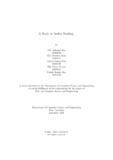| dc.contributor.advisor | Kaykobad, Mohammad | |
| dc.contributor.advisor | Kaykobad, M Tanvir | |
| dc.contributor.author | Haq, Md. Adnanul | |
| dc.contributor.author | Islam, Md. Noushin | |
| dc.contributor.author | Jeba, Labiba Tasfiya | |
| dc.contributor.author | Prome, Iffat Afsara | |
| dc.contributor.author | Roy, Palash Ranjan | |
| dc.date.accessioned | 2022-05-25T04:33:38Z | |
| dc.date.available | 2022-05-25T04:33:38Z | |
| dc.date.copyright | 2022 | |
| dc.date.issued | 2021-09 | |
| dc.identifier.other | ID 18301049 | |
| dc.identifier.other | ID 18301044 | |
| dc.identifier.other | ID 18101529 | |
| dc.identifier.other | ID 18101425 | |
| dc.identifier.other | ID 18101530 | |
| dc.identifier.uri | http://hdl.handle.net/10361/16670 | |
| dc.description | This thesis is submitted in partial fulfillment of the requirements for the degree of Bachelor of Science in Computer Science and Engineering, 2021. | en_US |
| dc.description | Cataloged from PDF version of thesis. | |
| dc.description | Includes bibliographical references (pages 30-31). | |
| dc.description.abstract | In this research we have studied the problem of ranking papers and authors based
upon their citations by other authors. Simple count of number of authors citing
a particular paper or author may not be very representative of the contributions
made simply because a paper or authors work may be of too prohibitive complexity
for too many authors to cite. It may so happen that only accomplished researchers
of grater heights can understand and assimilate their deep insightful contributions.
So simple count of number of citations may well fail to capture the essence. So we
proposed algorithms avoiding damping factors and assigning the weight (1 d) as
has been assigned in page ranking algorithm irrespective of any citation. We have
experimented with two versions of the algorithm. In the first version the score of a
paper/author has been completed based on the scores of papers that have cited it.
To do some justice to the papers that fail to attract citation from too many authors
due to their complexity we have considered the average quality of citing papers.
However, to give some weights to number of papers citing it we have multiplied the
score with the square root of number of papers citing it. Experimental results of all
these versions including paper rank have been presented.The current algorithms fail
to properly rank authors whose citation counts are less but whose contributions are
deemed important by the leading experts in the field. So in scoring of a researcher,
we would like to factor in the average score of researchers who cited their work. To
score these authors more fairly, we want to introduce a new Linear Programming
formulation based scoring system for researchers. The purpose of Author Rank is
to recognize the expertise of a person within certain subjects and what others think
about the content they publish. We want to use an algorithm which is based on
the System of linear equations. And the closest algorithm of this is Google’s Page
Rank algorithm. There is a need to consider the credibility of each author in order
to examine the relativity of this broad data. | en_US |
| dc.description.statementofresponsibility | Md. Adnanul Haq | |
| dc.description.statementofresponsibility | Md. Noushin Islam | |
| dc.description.statementofresponsibility | Labiba Tasfiya Jeba | |
| dc.description.statementofresponsibility | Iffat Afsara Prome | |
| dc.description.statementofresponsibility | Palash Ranjan Roy | |
| dc.format.extent | 31 pages | |
| dc.language.iso | en | en_US |
| dc.publisher | Brac University | en_US |
| dc.rights | Brac University theses are protected by copyright. They may be viewed from this source for any purpose, but reproduction or distribution in any format is prohibited without written permission. | |
| dc.subject | Citation | en_US |
| dc.subject | Page rank | en_US |
| dc.subject | Author rank | en_US |
| dc.subject.lcsh | Linear programming. | |
| dc.subject.lcsh | Artificial Intelligence | |
| dc.title | A study on author ranking | en_US |
| dc.type | Thesis | en_US |
| dc.contributor.department | Department of Computer Science and Engineering, Brac University | |
| dc.description.degree | B. Computer Science | |

